Organisational Behaviour Report: BBC Case Study, Motivation & Teams
VerifiedAdded on 2020/07/22
|15
|4621
|103
Report
AI Summary
This report provides an in-depth analysis of organisational behaviour within the British Broadcasting Corporation (BBC). It begins with an introduction to organisational behaviour and its impact on individual and team performance, followed by an examination of Handy's cultural typology within the BBC. The report explores the effects of organisational culture, politics, and power on employee behaviour and productivity. Task 2 focuses on motivational methods, including content and process theories like Maslow's hierarchy and Herzberg's two-factor theory, as well as their application within the BBC to enhance employee performance. Task 3 delves into different types of teams and the elements that contribute to effective teamwork. Finally, Task 4 examines the path-goal theory and identifies barriers to team performance, concluding with recommendations for improving organisational effectiveness. The report aims to provide insights into how the BBC can leverage organisational behaviour principles to improve employee motivation, team dynamics, and overall organisational success.
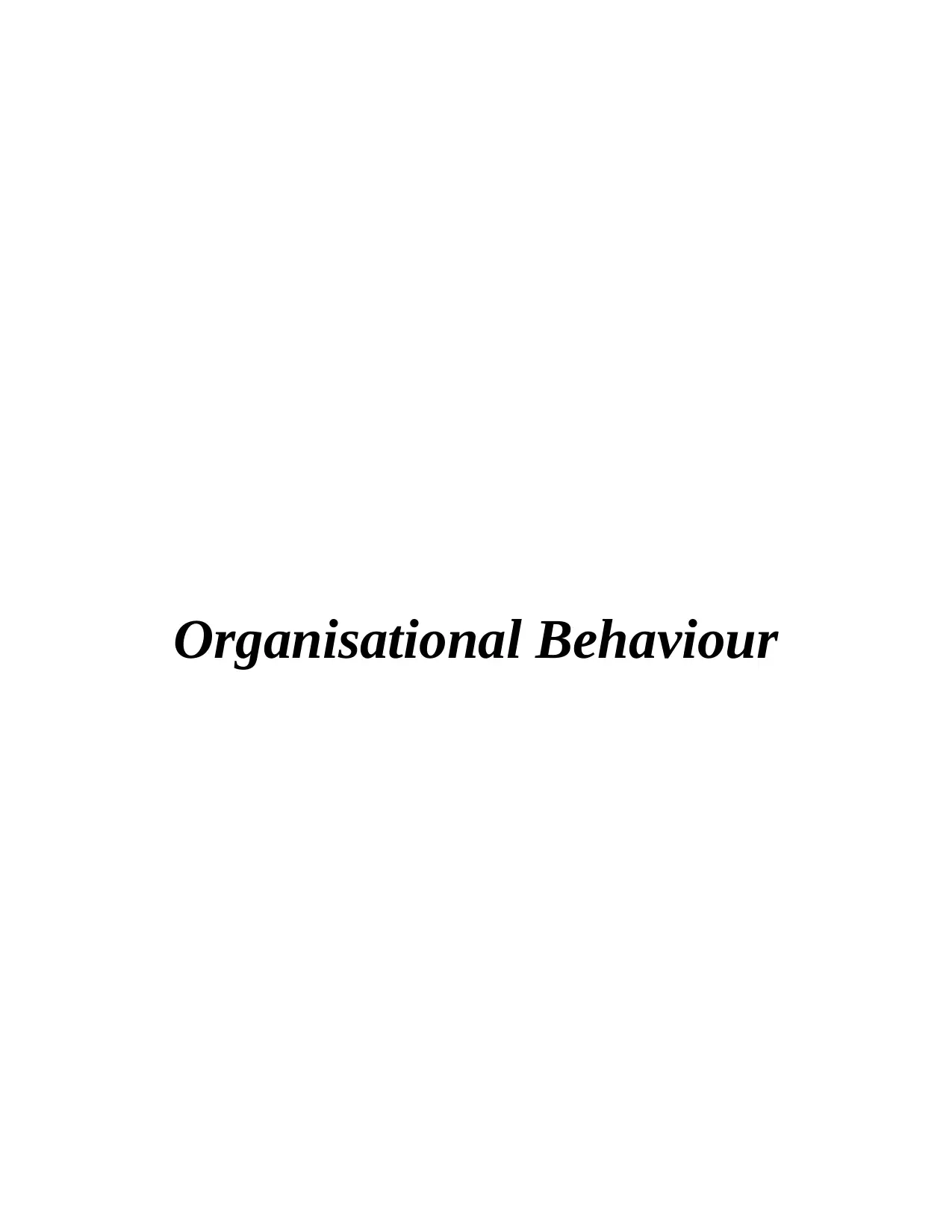
Organisational Behaviour
Paraphrase This Document
Need a fresh take? Get an instant paraphrase of this document with our AI Paraphraser
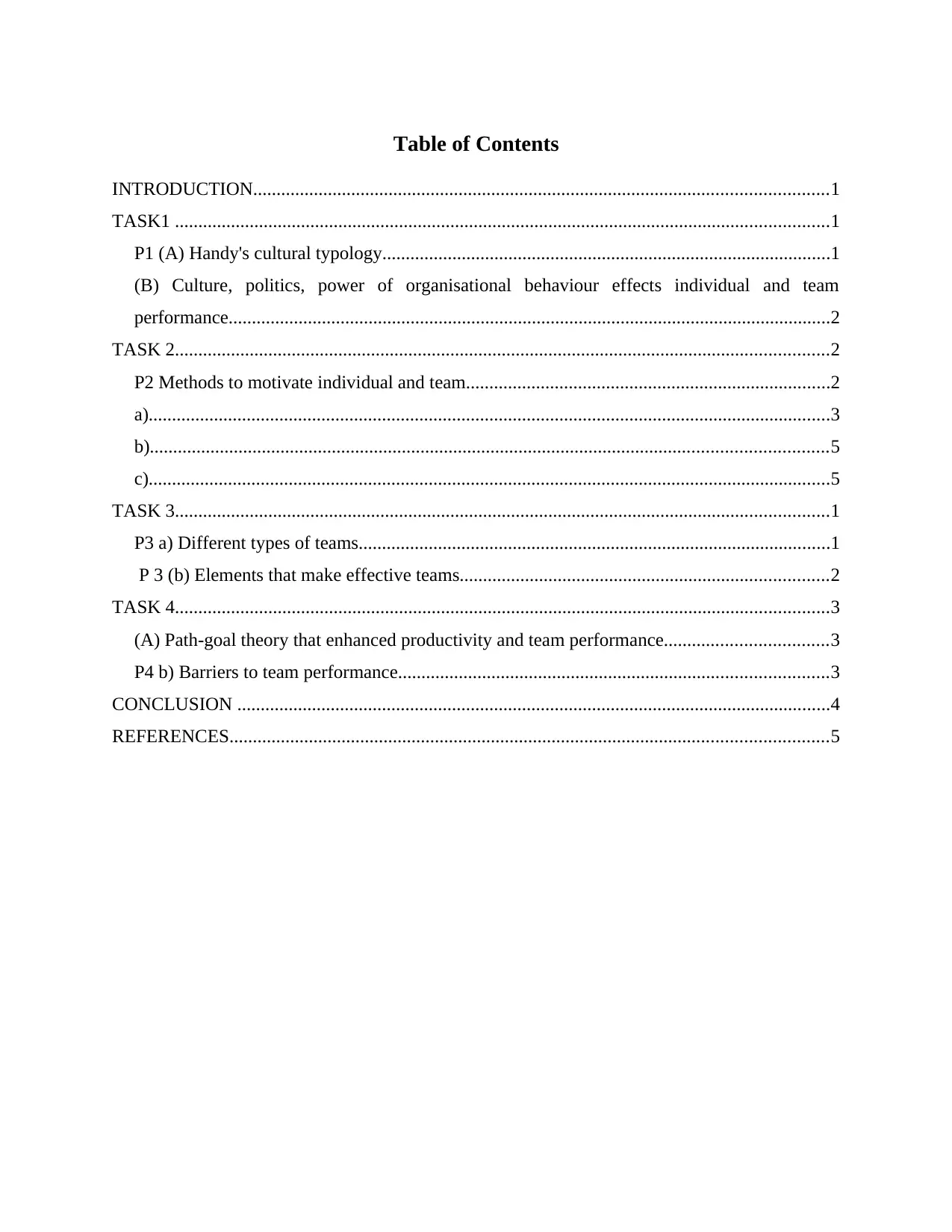
Table of Contents
INTRODUCTION...........................................................................................................................1
TASK1 ............................................................................................................................................1
P1 (A) Handy's cultural typology................................................................................................1
(B) Culture, politics, power of organisational behaviour effects individual and team
performance.................................................................................................................................2
TASK 2............................................................................................................................................2
P2 Methods to motivate individual and team..............................................................................2
a)..................................................................................................................................................3
b).................................................................................................................................................5
c)..................................................................................................................................................5
TASK 3............................................................................................................................................1
P3 a) Different types of teams.....................................................................................................1
P 3 (b) Elements that make effective teams...............................................................................2
TASK 4............................................................................................................................................3
(A) Path-goal theory that enhanced productivity and team performance...................................3
P4 b) Barriers to team performance............................................................................................3
CONCLUSION ...............................................................................................................................4
REFERENCES................................................................................................................................5
INTRODUCTION...........................................................................................................................1
TASK1 ............................................................................................................................................1
P1 (A) Handy's cultural typology................................................................................................1
(B) Culture, politics, power of organisational behaviour effects individual and team
performance.................................................................................................................................2
TASK 2............................................................................................................................................2
P2 Methods to motivate individual and team..............................................................................2
a)..................................................................................................................................................3
b).................................................................................................................................................5
c)..................................................................................................................................................5
TASK 3............................................................................................................................................1
P3 a) Different types of teams.....................................................................................................1
P 3 (b) Elements that make effective teams...............................................................................2
TASK 4............................................................................................................................................3
(A) Path-goal theory that enhanced productivity and team performance...................................3
P4 b) Barriers to team performance............................................................................................3
CONCLUSION ...............................................................................................................................4
REFERENCES................................................................................................................................5
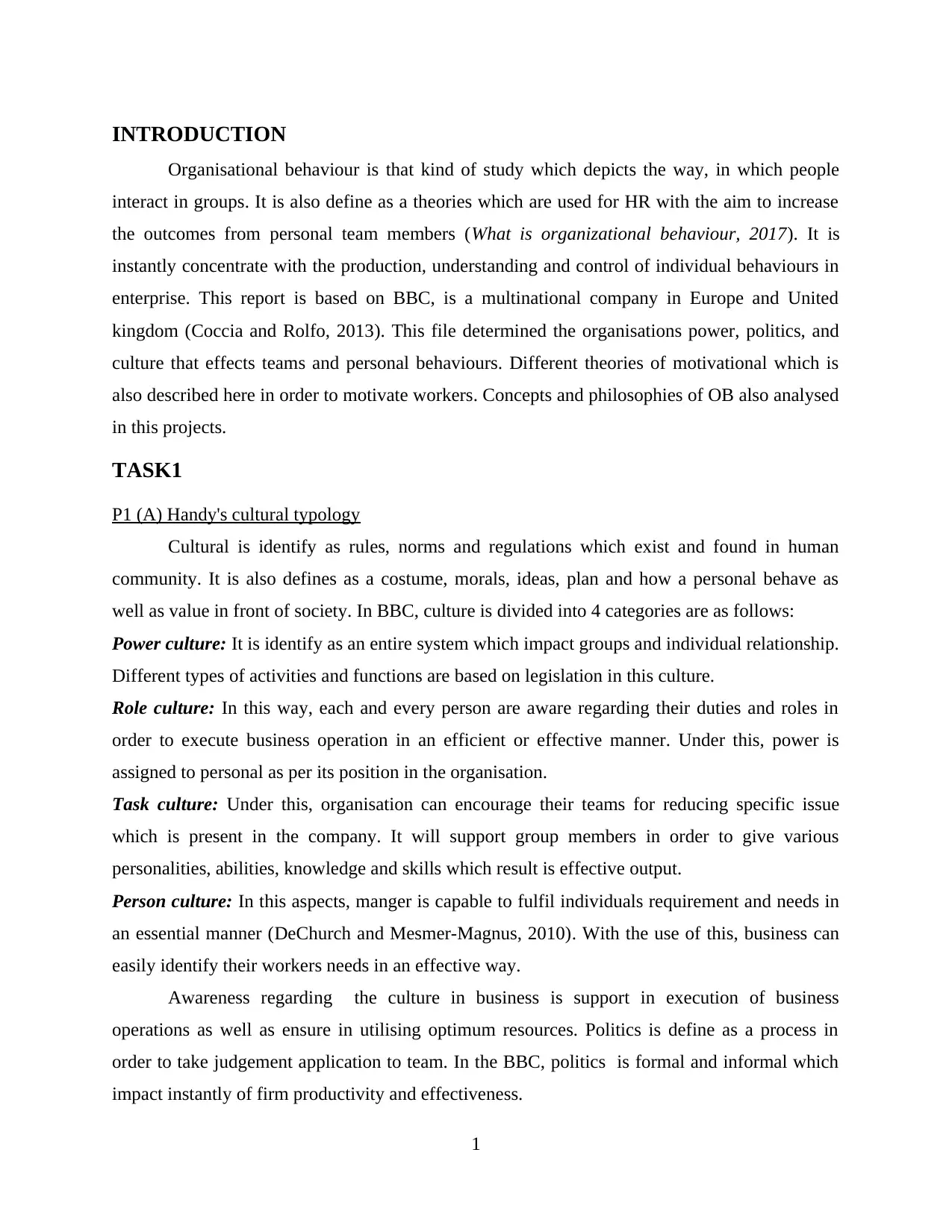
INTRODUCTION
Organisational behaviour is that kind of study which depicts the way, in which people
interact in groups. It is also define as a theories which are used for HR with the aim to increase
the outcomes from personal team members (What is organizational behaviour, 2017). It is
instantly concentrate with the production, understanding and control of individual behaviours in
enterprise. This report is based on BBC, is a multinational company in Europe and United
kingdom (Coccia and Rolfo, 2013). This file determined the organisations power, politics, and
culture that effects teams and personal behaviours. Different theories of motivational which is
also described here in order to motivate workers. Concepts and philosophies of OB also analysed
in this projects.
TASK1
P1 (A) Handy's cultural typology
Cultural is identify as rules, norms and regulations which exist and found in human
community. It is also defines as a costume, morals, ideas, plan and how a personal behave as
well as value in front of society. In BBC, culture is divided into 4 categories are as follows:
Power culture: It is identify as an entire system which impact groups and individual relationship.
Different types of activities and functions are based on legislation in this culture.
Role culture: In this way, each and every person are aware regarding their duties and roles in
order to execute business operation in an efficient or effective manner. Under this, power is
assigned to personal as per its position in the organisation.
Task culture: Under this, organisation can encourage their teams for reducing specific issue
which is present in the company. It will support group members in order to give various
personalities, abilities, knowledge and skills which result is effective output.
Person culture: In this aspects, manger is capable to fulfil individuals requirement and needs in
an essential manner (DeChurch and Mesmer-Magnus, 2010). With the use of this, business can
easily identify their workers needs in an effective way.
Awareness regarding the culture in business is support in execution of business
operations as well as ensure in utilising optimum resources. Politics is define as a process in
order to take judgement application to team. In the BBC, politics is formal and informal which
impact instantly of firm productivity and effectiveness.
1
Organisational behaviour is that kind of study which depicts the way, in which people
interact in groups. It is also define as a theories which are used for HR with the aim to increase
the outcomes from personal team members (What is organizational behaviour, 2017). It is
instantly concentrate with the production, understanding and control of individual behaviours in
enterprise. This report is based on BBC, is a multinational company in Europe and United
kingdom (Coccia and Rolfo, 2013). This file determined the organisations power, politics, and
culture that effects teams and personal behaviours. Different theories of motivational which is
also described here in order to motivate workers. Concepts and philosophies of OB also analysed
in this projects.
TASK1
P1 (A) Handy's cultural typology
Cultural is identify as rules, norms and regulations which exist and found in human
community. It is also defines as a costume, morals, ideas, plan and how a personal behave as
well as value in front of society. In BBC, culture is divided into 4 categories are as follows:
Power culture: It is identify as an entire system which impact groups and individual relationship.
Different types of activities and functions are based on legislation in this culture.
Role culture: In this way, each and every person are aware regarding their duties and roles in
order to execute business operation in an efficient or effective manner. Under this, power is
assigned to personal as per its position in the organisation.
Task culture: Under this, organisation can encourage their teams for reducing specific issue
which is present in the company. It will support group members in order to give various
personalities, abilities, knowledge and skills which result is effective output.
Person culture: In this aspects, manger is capable to fulfil individuals requirement and needs in
an essential manner (DeChurch and Mesmer-Magnus, 2010). With the use of this, business can
easily identify their workers needs in an effective way.
Awareness regarding the culture in business is support in execution of business
operations as well as ensure in utilising optimum resources. Politics is define as a process in
order to take judgement application to team. In the BBC, politics is formal and informal which
impact instantly of firm productivity and effectiveness.
1
⊘ This is a preview!⊘
Do you want full access?
Subscribe today to unlock all pages.

Trusted by 1+ million students worldwide
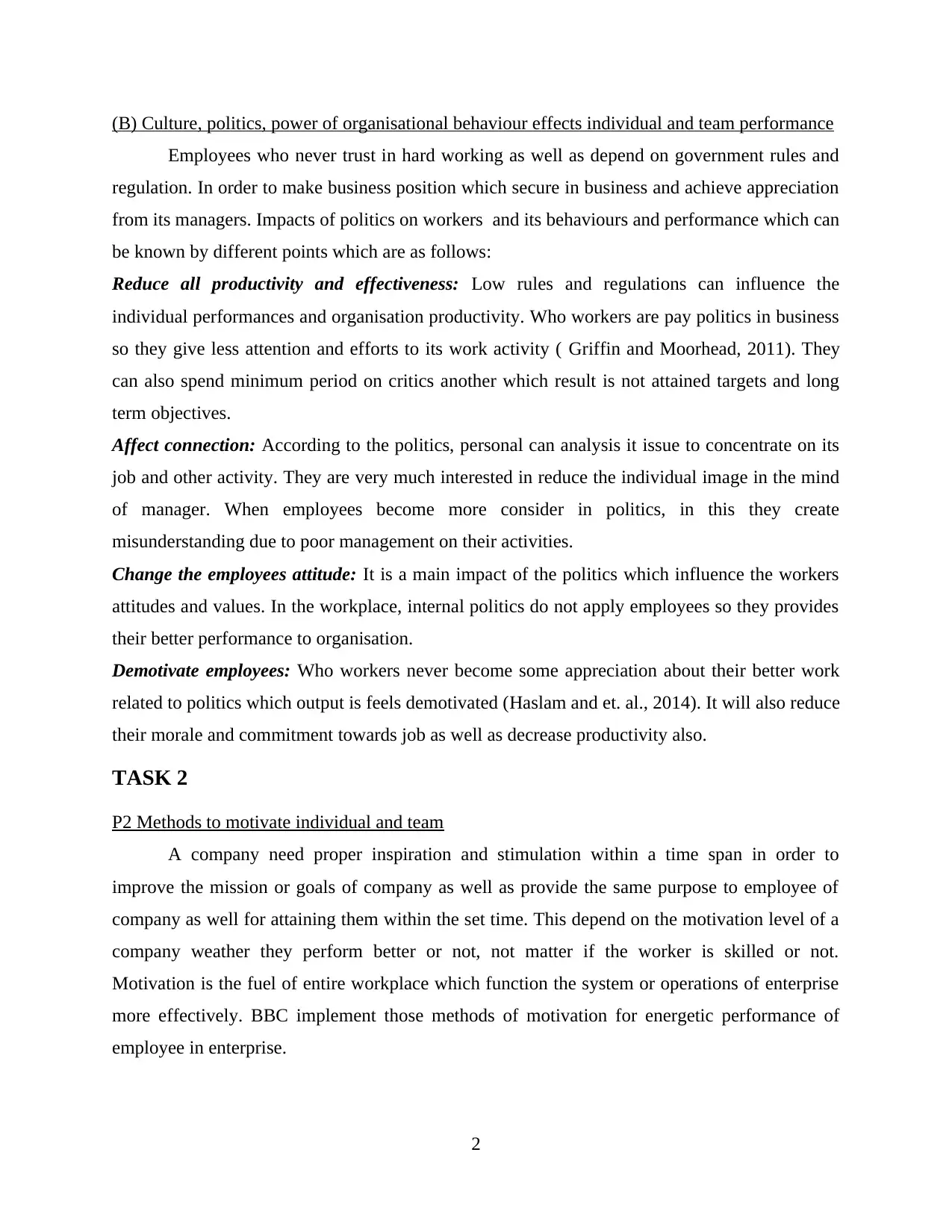
(B) Culture, politics, power of organisational behaviour effects individual and team performance
Employees who never trust in hard working as well as depend on government rules and
regulation. In order to make business position which secure in business and achieve appreciation
from its managers. Impacts of politics on workers and its behaviours and performance which can
be known by different points which are as follows:
Reduce all productivity and effectiveness: Low rules and regulations can influence the
individual performances and organisation productivity. Who workers are pay politics in business
so they give less attention and efforts to its work activity ( Griffin and Moorhead, 2011). They
can also spend minimum period on critics another which result is not attained targets and long
term objectives.
Affect connection: According to the politics, personal can analysis it issue to concentrate on its
job and other activity. They are very much interested in reduce the individual image in the mind
of manager. When employees become more consider in politics, in this they create
misunderstanding due to poor management on their activities.
Change the employees attitude: It is a main impact of the politics which influence the workers
attitudes and values. In the workplace, internal politics do not apply employees so they provides
their better performance to organisation.
Demotivate employees: Who workers never become some appreciation about their better work
related to politics which output is feels demotivated (Haslam and et. al., 2014). It will also reduce
their morale and commitment towards job as well as decrease productivity also.
TASK 2
P2 Methods to motivate individual and team
A company need proper inspiration and stimulation within a time span in order to
improve the mission or goals of company as well as provide the same purpose to employee of
company as well for attaining them within the set time. This depend on the motivation level of a
company weather they perform better or not, not matter if the worker is skilled or not.
Motivation is the fuel of entire workplace which function the system or operations of enterprise
more effectively. BBC implement those methods of motivation for energetic performance of
employee in enterprise.
2
Employees who never trust in hard working as well as depend on government rules and
regulation. In order to make business position which secure in business and achieve appreciation
from its managers. Impacts of politics on workers and its behaviours and performance which can
be known by different points which are as follows:
Reduce all productivity and effectiveness: Low rules and regulations can influence the
individual performances and organisation productivity. Who workers are pay politics in business
so they give less attention and efforts to its work activity ( Griffin and Moorhead, 2011). They
can also spend minimum period on critics another which result is not attained targets and long
term objectives.
Affect connection: According to the politics, personal can analysis it issue to concentrate on its
job and other activity. They are very much interested in reduce the individual image in the mind
of manager. When employees become more consider in politics, in this they create
misunderstanding due to poor management on their activities.
Change the employees attitude: It is a main impact of the politics which influence the workers
attitudes and values. In the workplace, internal politics do not apply employees so they provides
their better performance to organisation.
Demotivate employees: Who workers never become some appreciation about their better work
related to politics which output is feels demotivated (Haslam and et. al., 2014). It will also reduce
their morale and commitment towards job as well as decrease productivity also.
TASK 2
P2 Methods to motivate individual and team
A company need proper inspiration and stimulation within a time span in order to
improve the mission or goals of company as well as provide the same purpose to employee of
company as well for attaining them within the set time. This depend on the motivation level of a
company weather they perform better or not, not matter if the worker is skilled or not.
Motivation is the fuel of entire workplace which function the system or operations of enterprise
more effectively. BBC implement those methods of motivation for energetic performance of
employee in enterprise.
2
Paraphrase This Document
Need a fresh take? Get an instant paraphrase of this document with our AI Paraphraser
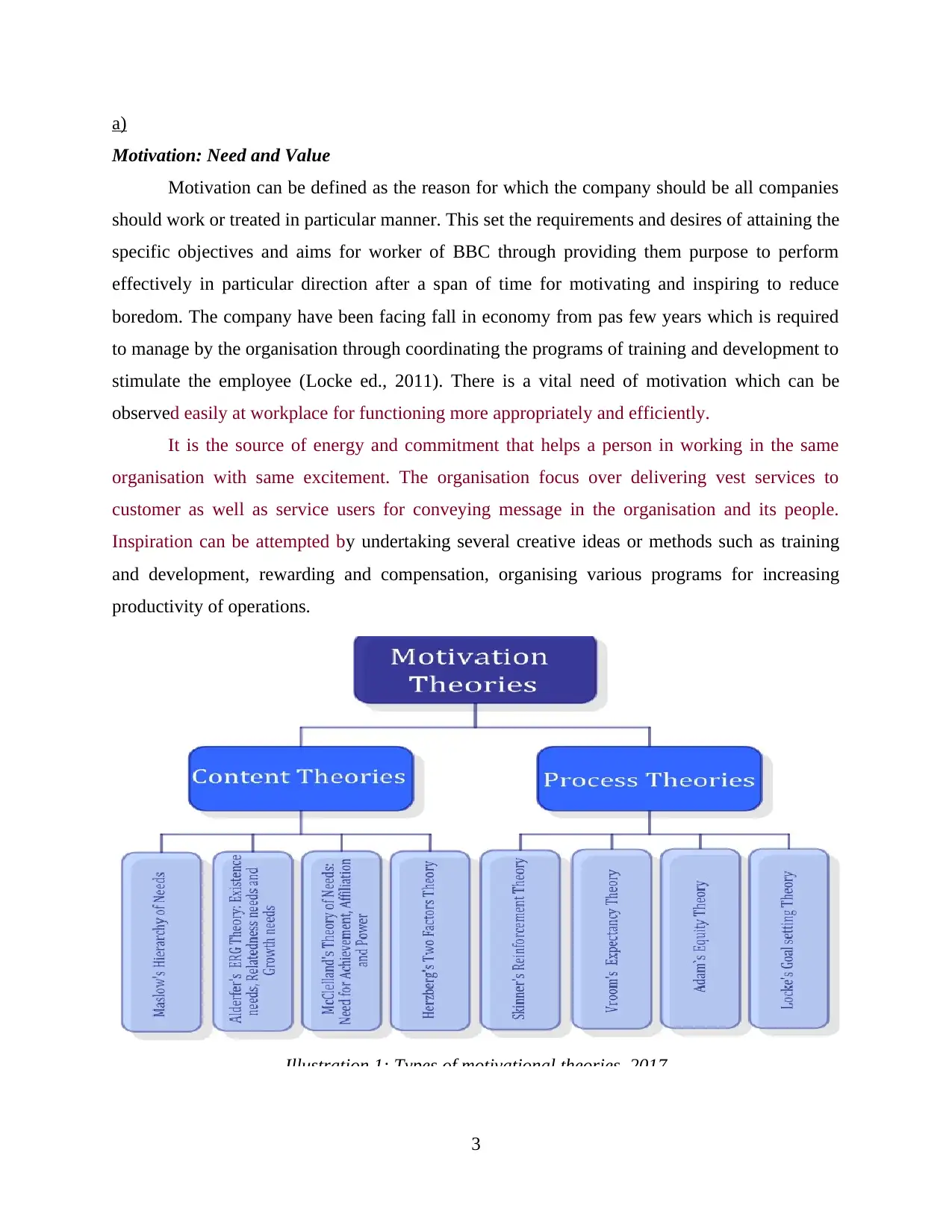
a)
Motivation: Need and Value
Motivation can be defined as the reason for which the company should be all companies
should work or treated in particular manner. This set the requirements and desires of attaining the
specific objectives and aims for worker of BBC through providing them purpose to perform
effectively in particular direction after a span of time for motivating and inspiring to reduce
boredom. The company have been facing fall in economy from pas few years which is required
to manage by the organisation through coordinating the programs of training and development to
stimulate the employee (Locke ed., 2011). There is a vital need of motivation which can be
observed easily at workplace for functioning more appropriately and efficiently.
It is the source of energy and commitment that helps a person in working in the same
organisation with same excitement. The organisation focus over delivering vest services to
customer as well as service users for conveying message in the organisation and its people.
Inspiration can be attempted by undertaking several creative ideas or methods such as training
and development, rewarding and compensation, organising various programs for increasing
productivity of operations.
Illustration 1: Types of motivational theories, 2017
3
Motivation: Need and Value
Motivation can be defined as the reason for which the company should be all companies
should work or treated in particular manner. This set the requirements and desires of attaining the
specific objectives and aims for worker of BBC through providing them purpose to perform
effectively in particular direction after a span of time for motivating and inspiring to reduce
boredom. The company have been facing fall in economy from pas few years which is required
to manage by the organisation through coordinating the programs of training and development to
stimulate the employee (Locke ed., 2011). There is a vital need of motivation which can be
observed easily at workplace for functioning more appropriately and efficiently.
It is the source of energy and commitment that helps a person in working in the same
organisation with same excitement. The organisation focus over delivering vest services to
customer as well as service users for conveying message in the organisation and its people.
Inspiration can be attempted by undertaking several creative ideas or methods such as training
and development, rewarding and compensation, organising various programs for increasing
productivity of operations.
Illustration 1: Types of motivational theories, 2017
3
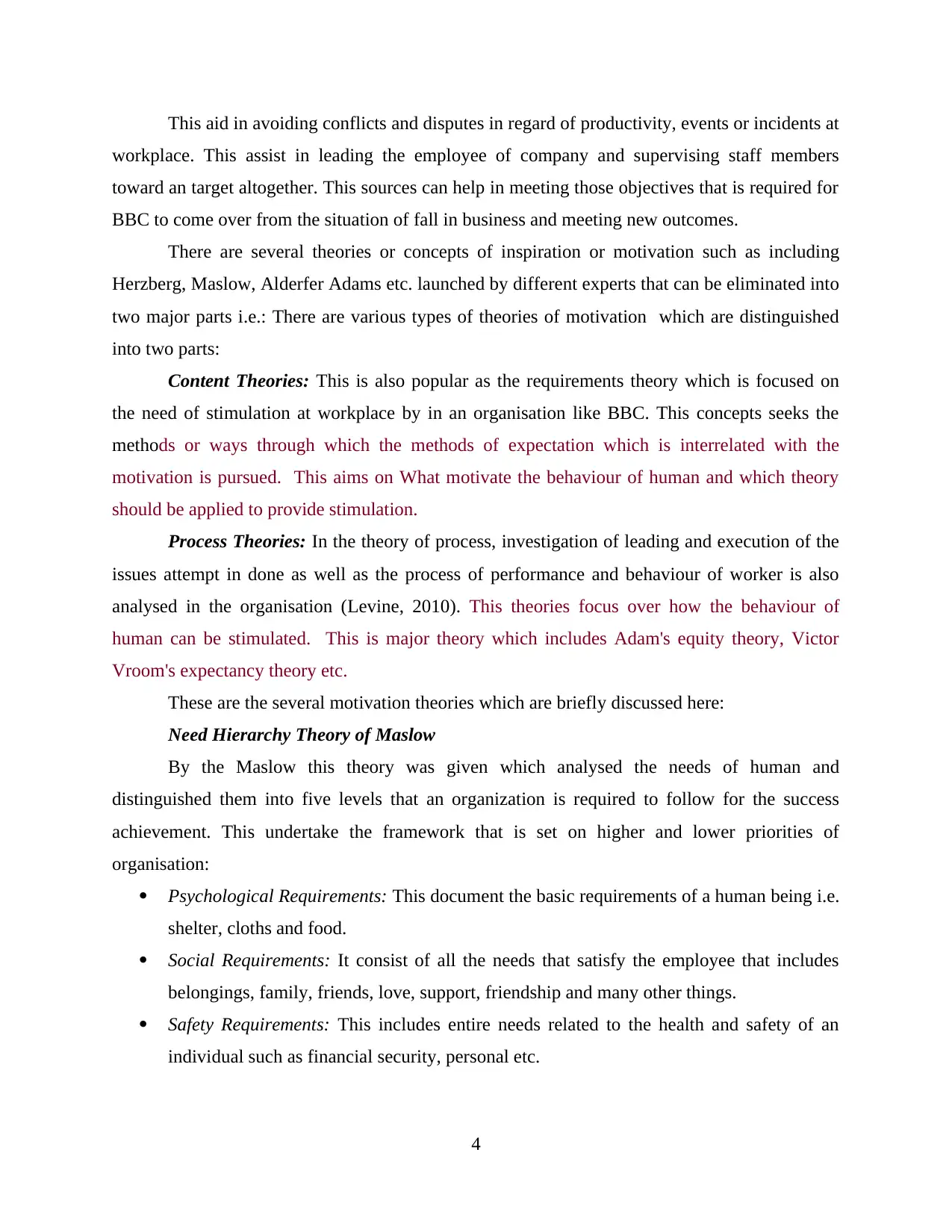
This aid in avoiding conflicts and disputes in regard of productivity, events or incidents at
workplace. This assist in leading the employee of company and supervising staff members
toward an target altogether. This sources can help in meeting those objectives that is required for
BBC to come over from the situation of fall in business and meeting new outcomes.
There are several theories or concepts of inspiration or motivation such as including
Herzberg, Maslow, Alderfer Adams etc. launched by different experts that can be eliminated into
two major parts i.e.: There are various types of theories of motivation which are distinguished
into two parts:
Content Theories: This is also popular as the requirements theory which is focused on
the need of stimulation at workplace by in an organisation like BBC. This concepts seeks the
methods or ways through which the methods of expectation which is interrelated with the
motivation is pursued. This aims on What motivate the behaviour of human and which theory
should be applied to provide stimulation.
Process Theories: In the theory of process, investigation of leading and execution of the
issues attempt in done as well as the process of performance and behaviour of worker is also
analysed in the organisation (Levine, 2010). This theories focus over how the behaviour of
human can be stimulated. This is major theory which includes Adam's equity theory, Victor
Vroom's expectancy theory etc.
These are the several motivation theories which are briefly discussed here:
Need Hierarchy Theory of Maslow
By the Maslow this theory was given which analysed the needs of human and
distinguished them into five levels that an organization is required to follow for the success
achievement. This undertake the framework that is set on higher and lower priorities of
organisation:
Psychological Requirements: This document the basic requirements of a human being i.e.
shelter, cloths and food.
Social Requirements: It consist of all the needs that satisfy the employee that includes
belongings, family, friends, love, support, friendship and many other things.
Safety Requirements: This includes entire needs related to the health and safety of an
individual such as financial security, personal etc.
4
workplace. This assist in leading the employee of company and supervising staff members
toward an target altogether. This sources can help in meeting those objectives that is required for
BBC to come over from the situation of fall in business and meeting new outcomes.
There are several theories or concepts of inspiration or motivation such as including
Herzberg, Maslow, Alderfer Adams etc. launched by different experts that can be eliminated into
two major parts i.e.: There are various types of theories of motivation which are distinguished
into two parts:
Content Theories: This is also popular as the requirements theory which is focused on
the need of stimulation at workplace by in an organisation like BBC. This concepts seeks the
methods or ways through which the methods of expectation which is interrelated with the
motivation is pursued. This aims on What motivate the behaviour of human and which theory
should be applied to provide stimulation.
Process Theories: In the theory of process, investigation of leading and execution of the
issues attempt in done as well as the process of performance and behaviour of worker is also
analysed in the organisation (Levine, 2010). This theories focus over how the behaviour of
human can be stimulated. This is major theory which includes Adam's equity theory, Victor
Vroom's expectancy theory etc.
These are the several motivation theories which are briefly discussed here:
Need Hierarchy Theory of Maslow
By the Maslow this theory was given which analysed the needs of human and
distinguished them into five levels that an organization is required to follow for the success
achievement. This undertake the framework that is set on higher and lower priorities of
organisation:
Psychological Requirements: This document the basic requirements of a human being i.e.
shelter, cloths and food.
Social Requirements: It consist of all the needs that satisfy the employee that includes
belongings, family, friends, love, support, friendship and many other things.
Safety Requirements: This includes entire needs related to the health and safety of an
individual such as financial security, personal etc.
4
⊘ This is a preview!⊘
Do you want full access?
Subscribe today to unlock all pages.

Trusted by 1+ million students worldwide
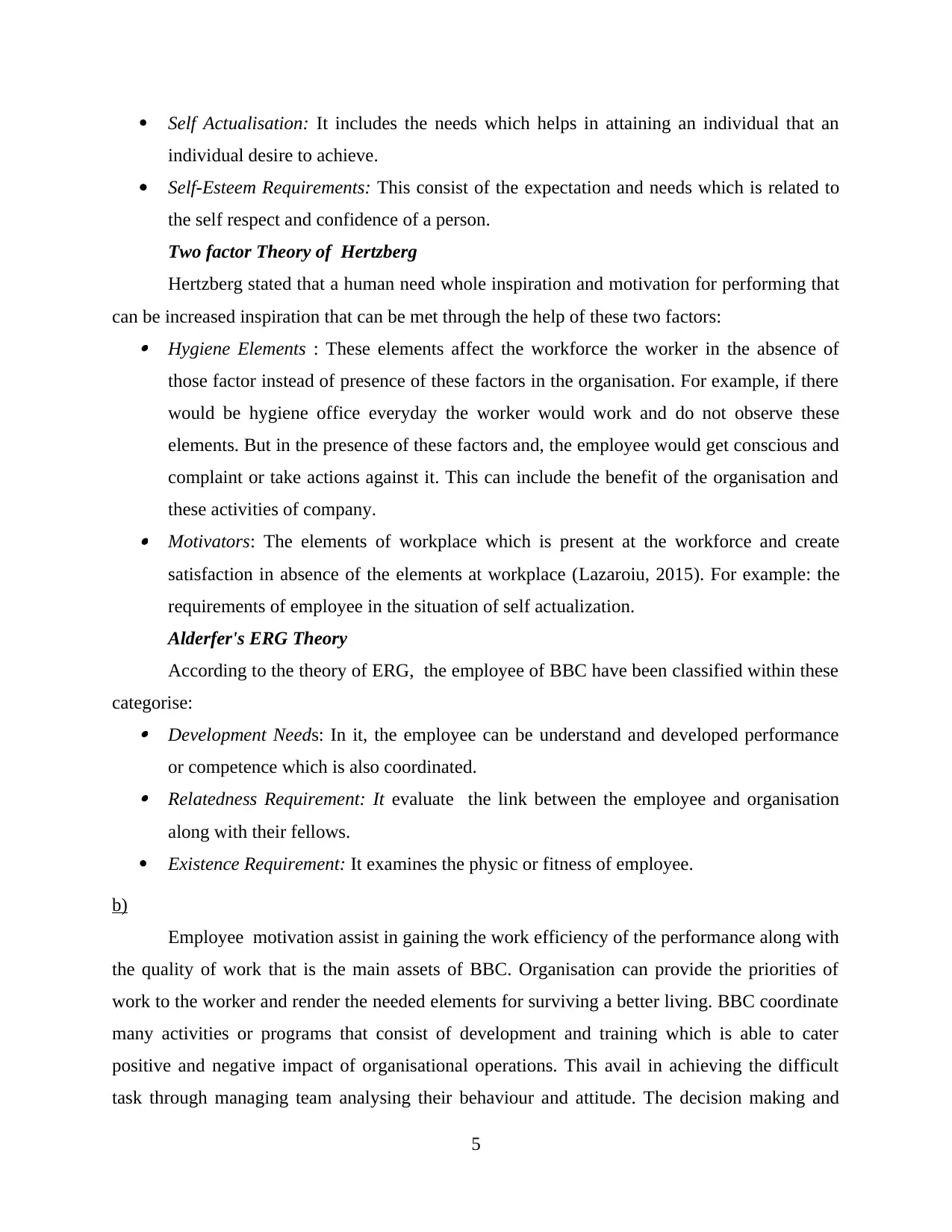
Self Actualisation: It includes the needs which helps in attaining an individual that an
individual desire to achieve.
Self-Esteem Requirements: This consist of the expectation and needs which is related to
the self respect and confidence of a person.
Two factor Theory of Hertzberg
Hertzberg stated that a human need whole inspiration and motivation for performing that
can be increased inspiration that can be met through the help of these two factors: Hygiene Elements : These elements affect the workforce the worker in the absence of
those factor instead of presence of these factors in the organisation. For example, if there
would be hygiene office everyday the worker would work and do not observe these
elements. But in the presence of these factors and, the employee would get conscious and
complaint or take actions against it. This can include the benefit of the organisation and
these activities of company. Motivators: The elements of workplace which is present at the workforce and create
satisfaction in absence of the elements at workplace (Lazaroiu, 2015). For example: the
requirements of employee in the situation of self actualization.
Alderfer's ERG Theory
According to the theory of ERG, the employee of BBC have been classified within these
categorise: Development Needs: In it, the employee can be understand and developed performance
or competence which is also coordinated. Relatedness Requirement: It evaluate the link between the employee and organisation
along with their fellows.
Existence Requirement: It examines the physic or fitness of employee.
b)
Employee motivation assist in gaining the work efficiency of the performance along with
the quality of work that is the main assets of BBC. Organisation can provide the priorities of
work to the worker and render the needed elements for surviving a better living. BBC coordinate
many activities or programs that consist of development and training which is able to cater
positive and negative impact of organisational operations. This avail in achieving the difficult
task through managing team analysing their behaviour and attitude. The decision making and
5
individual desire to achieve.
Self-Esteem Requirements: This consist of the expectation and needs which is related to
the self respect and confidence of a person.
Two factor Theory of Hertzberg
Hertzberg stated that a human need whole inspiration and motivation for performing that
can be increased inspiration that can be met through the help of these two factors: Hygiene Elements : These elements affect the workforce the worker in the absence of
those factor instead of presence of these factors in the organisation. For example, if there
would be hygiene office everyday the worker would work and do not observe these
elements. But in the presence of these factors and, the employee would get conscious and
complaint or take actions against it. This can include the benefit of the organisation and
these activities of company. Motivators: The elements of workplace which is present at the workforce and create
satisfaction in absence of the elements at workplace (Lazaroiu, 2015). For example: the
requirements of employee in the situation of self actualization.
Alderfer's ERG Theory
According to the theory of ERG, the employee of BBC have been classified within these
categorise: Development Needs: In it, the employee can be understand and developed performance
or competence which is also coordinated. Relatedness Requirement: It evaluate the link between the employee and organisation
along with their fellows.
Existence Requirement: It examines the physic or fitness of employee.
b)
Employee motivation assist in gaining the work efficiency of the performance along with
the quality of work that is the main assets of BBC. Organisation can provide the priorities of
work to the worker and render the needed elements for surviving a better living. BBC coordinate
many activities or programs that consist of development and training which is able to cater
positive and negative impact of organisational operations. This avail in achieving the difficult
task through managing team analysing their behaviour and attitude. The decision making and
5
Paraphrase This Document
Need a fresh take? Get an instant paraphrase of this document with our AI Paraphraser
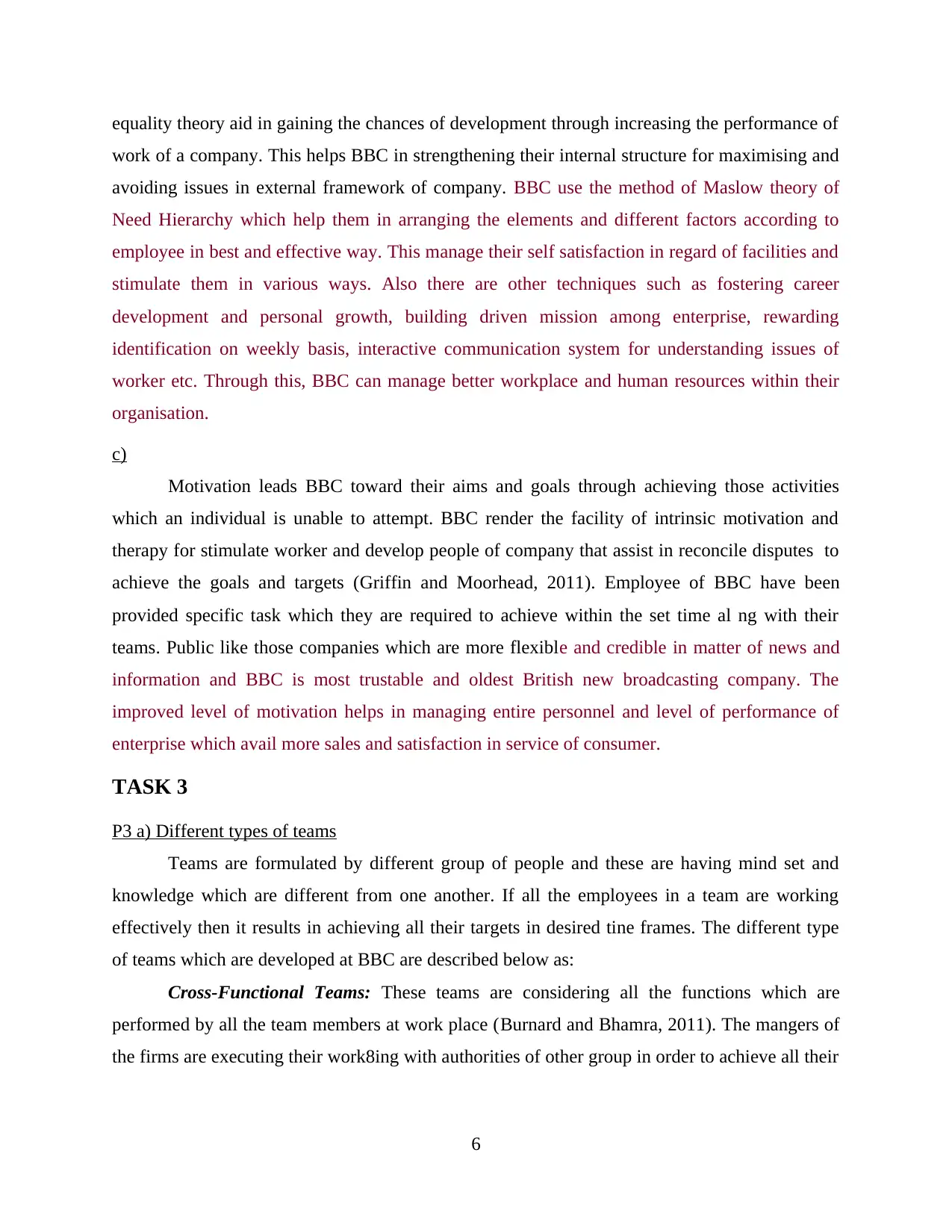
equality theory aid in gaining the chances of development through increasing the performance of
work of a company. This helps BBC in strengthening their internal structure for maximising and
avoiding issues in external framework of company. BBC use the method of Maslow theory of
Need Hierarchy which help them in arranging the elements and different factors according to
employee in best and effective way. This manage their self satisfaction in regard of facilities and
stimulate them in various ways. Also there are other techniques such as fostering career
development and personal growth, building driven mission among enterprise, rewarding
identification on weekly basis, interactive communication system for understanding issues of
worker etc. Through this, BBC can manage better workplace and human resources within their
organisation.
c)
Motivation leads BBC toward their aims and goals through achieving those activities
which an individual is unable to attempt. BBC render the facility of intrinsic motivation and
therapy for stimulate worker and develop people of company that assist in reconcile disputes to
achieve the goals and targets (Griffin and Moorhead, 2011). Employee of BBC have been
provided specific task which they are required to achieve within the set time al ng with their
teams. Public like those companies which are more flexible and credible in matter of news and
information and BBC is most trustable and oldest British new broadcasting company. The
improved level of motivation helps in managing entire personnel and level of performance of
enterprise which avail more sales and satisfaction in service of consumer.
TASK 3
P3 a) Different types of teams
Teams are formulated by different group of people and these are having mind set and
knowledge which are different from one another. If all the employees in a team are working
effectively then it results in achieving all their targets in desired tine frames. The different type
of teams which are developed at BBC are described below as:
Cross-Functional Teams: These teams are considering all the functions which are
performed by all the team members at work place (Burnard and Bhamra, 2011). The mangers of
the firms are executing their work8ing with authorities of other group in order to achieve all their
6
work of a company. This helps BBC in strengthening their internal structure for maximising and
avoiding issues in external framework of company. BBC use the method of Maslow theory of
Need Hierarchy which help them in arranging the elements and different factors according to
employee in best and effective way. This manage their self satisfaction in regard of facilities and
stimulate them in various ways. Also there are other techniques such as fostering career
development and personal growth, building driven mission among enterprise, rewarding
identification on weekly basis, interactive communication system for understanding issues of
worker etc. Through this, BBC can manage better workplace and human resources within their
organisation.
c)
Motivation leads BBC toward their aims and goals through achieving those activities
which an individual is unable to attempt. BBC render the facility of intrinsic motivation and
therapy for stimulate worker and develop people of company that assist in reconcile disputes to
achieve the goals and targets (Griffin and Moorhead, 2011). Employee of BBC have been
provided specific task which they are required to achieve within the set time al ng with their
teams. Public like those companies which are more flexible and credible in matter of news and
information and BBC is most trustable and oldest British new broadcasting company. The
improved level of motivation helps in managing entire personnel and level of performance of
enterprise which avail more sales and satisfaction in service of consumer.
TASK 3
P3 a) Different types of teams
Teams are formulated by different group of people and these are having mind set and
knowledge which are different from one another. If all the employees in a team are working
effectively then it results in achieving all their targets in desired tine frames. The different type
of teams which are developed at BBC are described below as:
Cross-Functional Teams: These teams are considering all the functions which are
performed by all the team members at work place (Burnard and Bhamra, 2011). The mangers of
the firms are executing their work8ing with authorities of other group in order to achieve all their
6
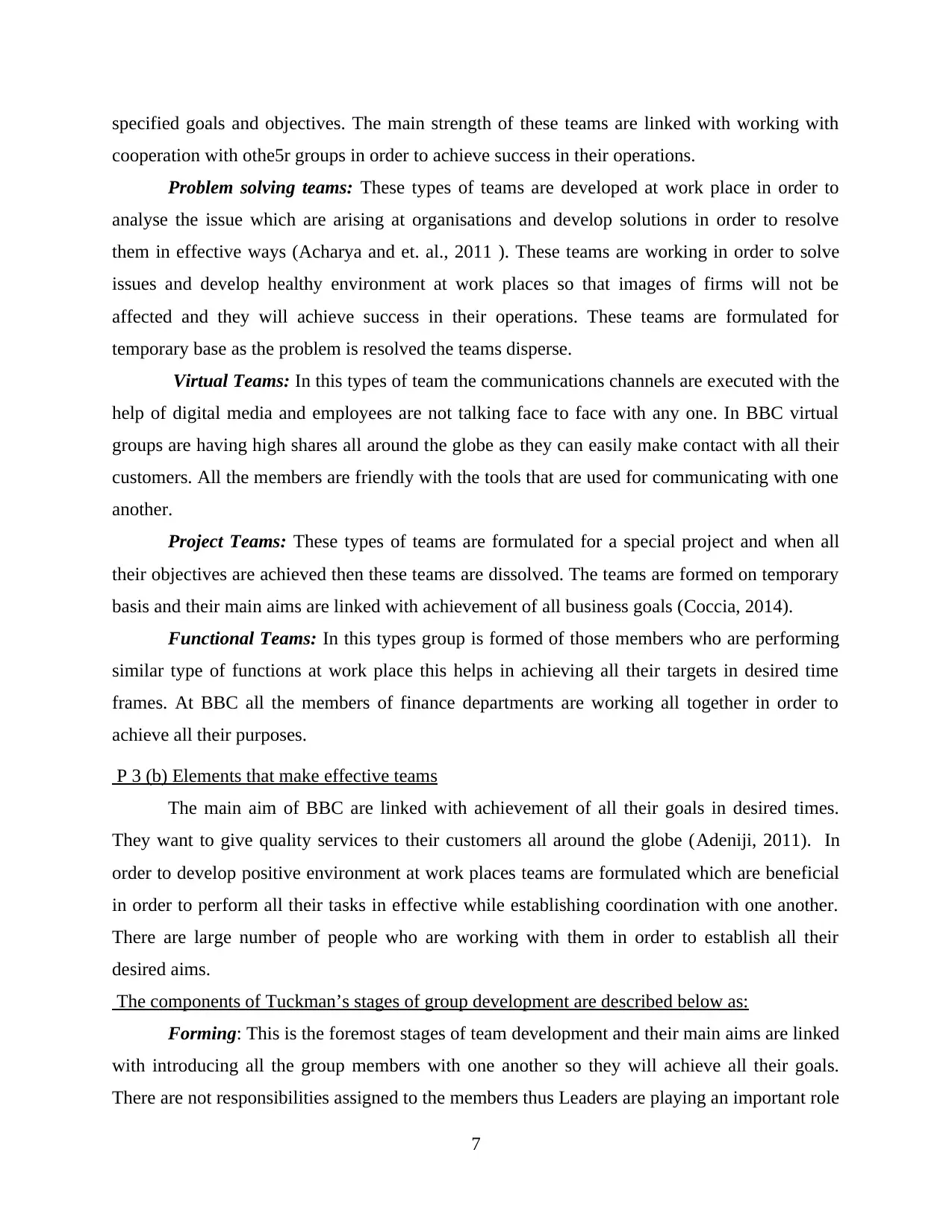
specified goals and objectives. The main strength of these teams are linked with working with
cooperation with othe5r groups in order to achieve success in their operations.
Problem solving teams: These types of teams are developed at work place in order to
analyse the issue which are arising at organisations and develop solutions in order to resolve
them in effective ways (Acharya and et. al., 2011 ). These teams are working in order to solve
issues and develop healthy environment at work places so that images of firms will not be
affected and they will achieve success in their operations. These teams are formulated for
temporary base as the problem is resolved the teams disperse.
Virtual Teams: In this types of team the communications channels are executed with the
help of digital media and employees are not talking face to face with any one. In BBC virtual
groups are having high shares all around the globe as they can easily make contact with all their
customers. All the members are friendly with the tools that are used for communicating with one
another.
Project Teams: These types of teams are formulated for a special project and when all
their objectives are achieved then these teams are dissolved. The teams are formed on temporary
basis and their main aims are linked with achievement of all business goals (Coccia, 2014).
Functional Teams: In this types group is formed of those members who are performing
similar type of functions at work place this helps in achieving all their targets in desired time
frames. At BBC all the members of finance departments are working all together in order to
achieve all their purposes.
P 3 (b) Elements that make effective teams
The main aim of BBC are linked with achievement of all their goals in desired times.
They want to give quality services to their customers all around the globe (Adeniji, 2011). In
order to develop positive environment at work places teams are formulated which are beneficial
in order to perform all their tasks in effective while establishing coordination with one another.
There are large number of people who are working with them in order to establish all their
desired aims.
The components of Tuckman’s stages of group development are described below as:
Forming: This is the foremost stages of team development and their main aims are linked
with introducing all the group members with one another so they will achieve all their goals.
There are not responsibilities assigned to the members thus Leaders are playing an important role
7
cooperation with othe5r groups in order to achieve success in their operations.
Problem solving teams: These types of teams are developed at work place in order to
analyse the issue which are arising at organisations and develop solutions in order to resolve
them in effective ways (Acharya and et. al., 2011 ). These teams are working in order to solve
issues and develop healthy environment at work places so that images of firms will not be
affected and they will achieve success in their operations. These teams are formulated for
temporary base as the problem is resolved the teams disperse.
Virtual Teams: In this types of team the communications channels are executed with the
help of digital media and employees are not talking face to face with any one. In BBC virtual
groups are having high shares all around the globe as they can easily make contact with all their
customers. All the members are friendly with the tools that are used for communicating with one
another.
Project Teams: These types of teams are formulated for a special project and when all
their objectives are achieved then these teams are dissolved. The teams are formed on temporary
basis and their main aims are linked with achievement of all business goals (Coccia, 2014).
Functional Teams: In this types group is formed of those members who are performing
similar type of functions at work place this helps in achieving all their targets in desired time
frames. At BBC all the members of finance departments are working all together in order to
achieve all their purposes.
P 3 (b) Elements that make effective teams
The main aim of BBC are linked with achievement of all their goals in desired times.
They want to give quality services to their customers all around the globe (Adeniji, 2011). In
order to develop positive environment at work places teams are formulated which are beneficial
in order to perform all their tasks in effective while establishing coordination with one another.
There are large number of people who are working with them in order to establish all their
desired aims.
The components of Tuckman’s stages of group development are described below as:
Forming: This is the foremost stages of team development and their main aims are linked
with introducing all the group members with one another so they will achieve all their goals.
There are not responsibilities assigned to the members thus Leaders are playing an important role
7
⊘ This is a preview!⊘
Do you want full access?
Subscribe today to unlock all pages.

Trusted by 1+ million students worldwide
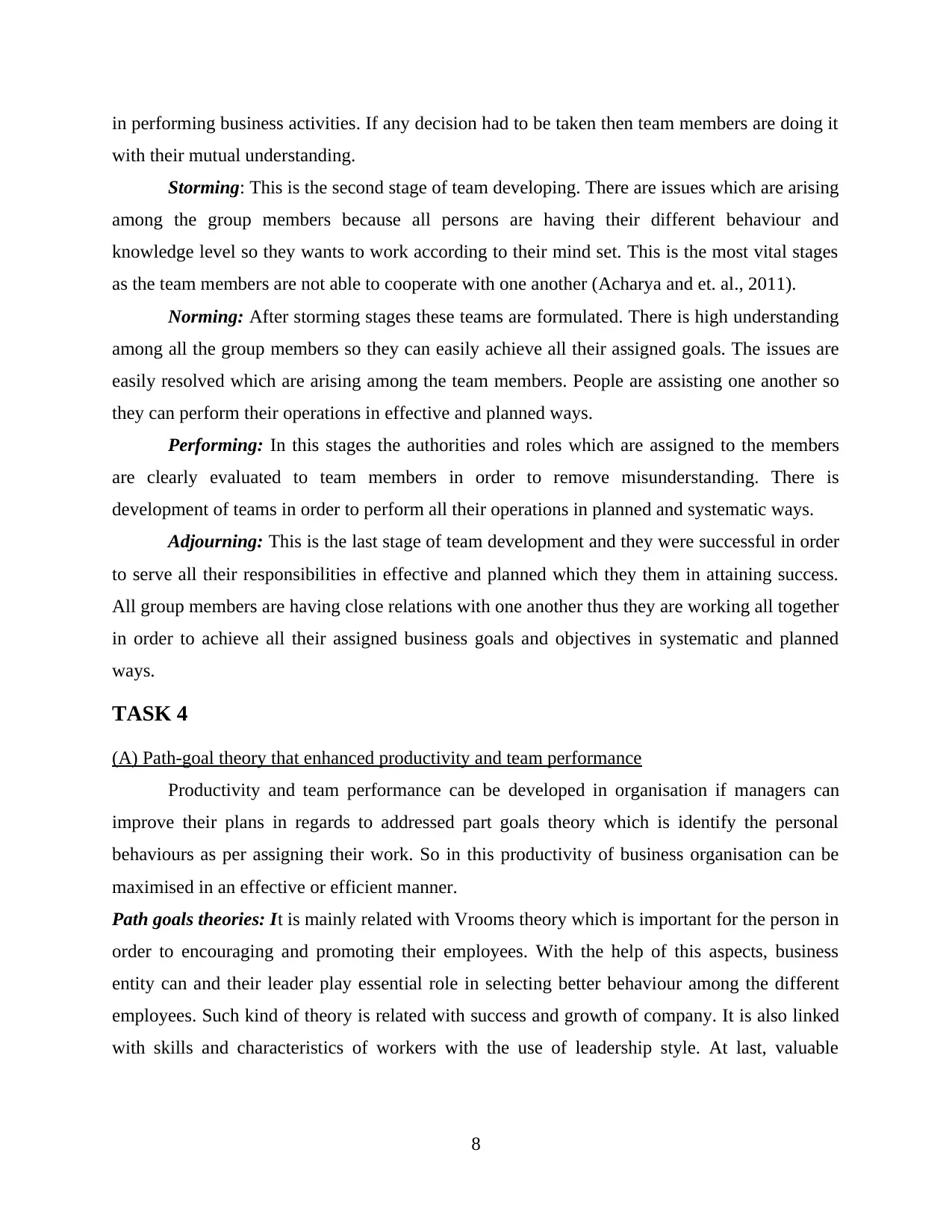
in performing business activities. If any decision had to be taken then team members are doing it
with their mutual understanding.
Storming: This is the second stage of team developing. There are issues which are arising
among the group members because all persons are having their different behaviour and
knowledge level so they wants to work according to their mind set. This is the most vital stages
as the team members are not able to cooperate with one another (Acharya and et. al., 2011).
Norming: After storming stages these teams are formulated. There is high understanding
among all the group members so they can easily achieve all their assigned goals. The issues are
easily resolved which are arising among the team members. People are assisting one another so
they can perform their operations in effective and planned ways.
Performing: In this stages the authorities and roles which are assigned to the members
are clearly evaluated to team members in order to remove misunderstanding. There is
development of teams in order to perform all their operations in planned and systematic ways.
Adjourning: This is the last stage of team development and they were successful in order
to serve all their responsibilities in effective and planned which they them in attaining success.
All group members are having close relations with one another thus they are working all together
in order to achieve all their assigned business goals and objectives in systematic and planned
ways.
TASK 4
(A) Path-goal theory that enhanced productivity and team performance
Productivity and team performance can be developed in organisation if managers can
improve their plans in regards to addressed part goals theory which is identify the personal
behaviours as per assigning their work. So in this productivity of business organisation can be
maximised in an effective or efficient manner.
Path goals theories: It is mainly related with Vrooms theory which is important for the person in
order to encouraging and promoting their employees. With the help of this aspects, business
entity can and their leader play essential role in selecting better behaviour among the different
employees. Such kind of theory is related with success and growth of company. It is also linked
with skills and characteristics of workers with the use of leadership style. At last, valuable
8
with their mutual understanding.
Storming: This is the second stage of team developing. There are issues which are arising
among the group members because all persons are having their different behaviour and
knowledge level so they wants to work according to their mind set. This is the most vital stages
as the team members are not able to cooperate with one another (Acharya and et. al., 2011).
Norming: After storming stages these teams are formulated. There is high understanding
among all the group members so they can easily achieve all their assigned goals. The issues are
easily resolved which are arising among the team members. People are assisting one another so
they can perform their operations in effective and planned ways.
Performing: In this stages the authorities and roles which are assigned to the members
are clearly evaluated to team members in order to remove misunderstanding. There is
development of teams in order to perform all their operations in planned and systematic ways.
Adjourning: This is the last stage of team development and they were successful in order
to serve all their responsibilities in effective and planned which they them in attaining success.
All group members are having close relations with one another thus they are working all together
in order to achieve all their assigned business goals and objectives in systematic and planned
ways.
TASK 4
(A) Path-goal theory that enhanced productivity and team performance
Productivity and team performance can be developed in organisation if managers can
improve their plans in regards to addressed part goals theory which is identify the personal
behaviours as per assigning their work. So in this productivity of business organisation can be
maximised in an effective or efficient manner.
Path goals theories: It is mainly related with Vrooms theory which is important for the person in
order to encouraging and promoting their employees. With the help of this aspects, business
entity can and their leader play essential role in selecting better behaviour among the different
employees. Such kind of theory is related with success and growth of company. It is also linked
with skills and characteristics of workers with the use of leadership style. At last, valuable
8
Paraphrase This Document
Need a fresh take? Get an instant paraphrase of this document with our AI Paraphraser
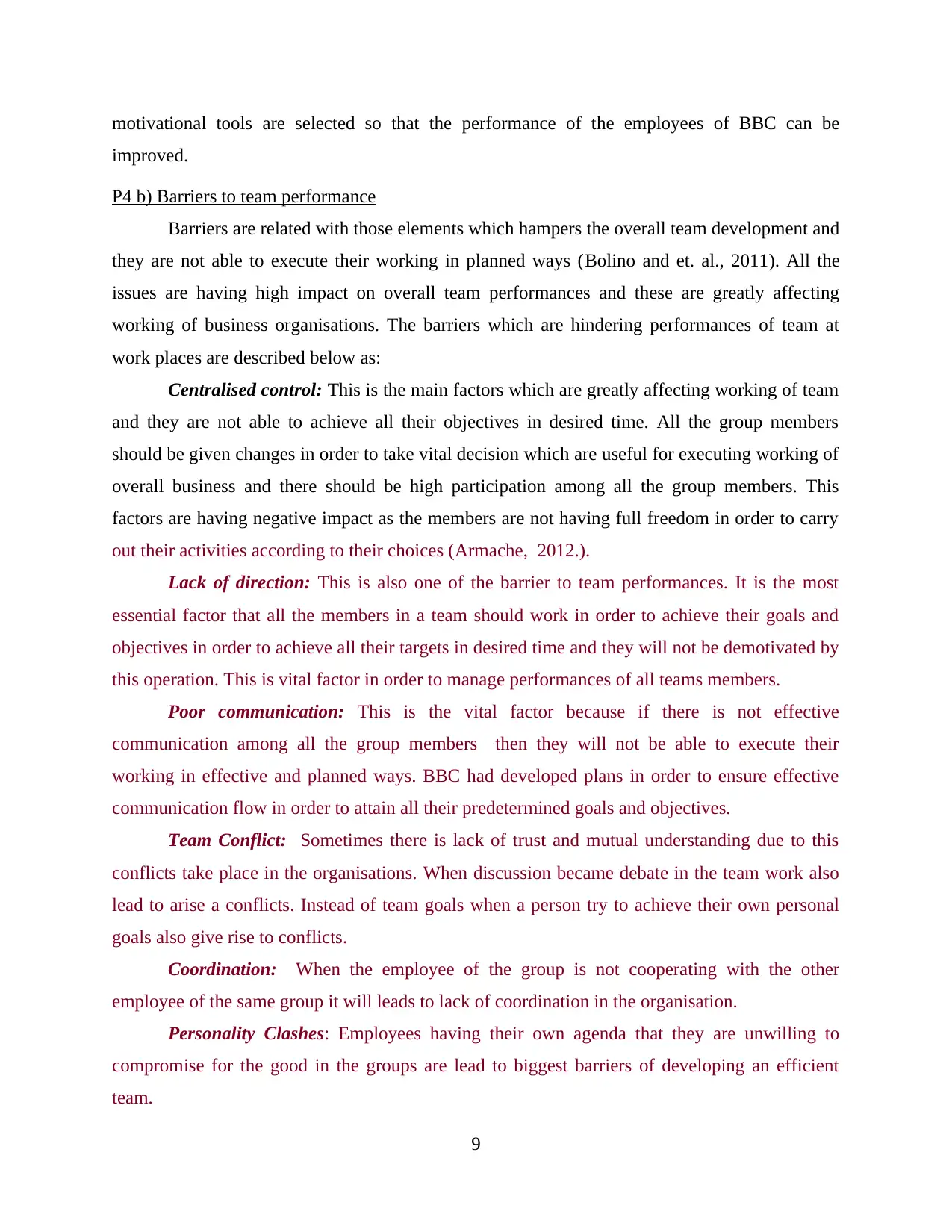
motivational tools are selected so that the performance of the employees of BBC can be
improved.
P4 b) Barriers to team performance
Barriers are related with those elements which hampers the overall team development and
they are not able to execute their working in planned ways (Bolino and et. al., 2011). All the
issues are having high impact on overall team performances and these are greatly affecting
working of business organisations. The barriers which are hindering performances of team at
work places are described below as:
Centralised control: This is the main factors which are greatly affecting working of team
and they are not able to achieve all their objectives in desired time. All the group members
should be given changes in order to take vital decision which are useful for executing working of
overall business and there should be high participation among all the group members. This
factors are having negative impact as the members are not having full freedom in order to carry
out their activities according to their choices (Armache, 2012.).
Lack of direction: This is also one of the barrier to team performances. It is the most
essential factor that all the members in a team should work in order to achieve their goals and
objectives in order to achieve all their targets in desired time and they will not be demotivated by
this operation. This is vital factor in order to manage performances of all teams members.
Poor communication: This is the vital factor because if there is not effective
communication among all the group members then they will not be able to execute their
working in effective and planned ways. BBC had developed plans in order to ensure effective
communication flow in order to attain all their predetermined goals and objectives.
Team Conflict: Sometimes there is lack of trust and mutual understanding due to this
conflicts take place in the organisations. When discussion became debate in the team work also
lead to arise a conflicts. Instead of team goals when a person try to achieve their own personal
goals also give rise to conflicts.
Coordination: When the employee of the group is not cooperating with the other
employee of the same group it will leads to lack of coordination in the organisation.
Personality Clashes: Employees having their own agenda that they are unwilling to
compromise for the good in the groups are lead to biggest barriers of developing an efficient
team.
9
improved.
P4 b) Barriers to team performance
Barriers are related with those elements which hampers the overall team development and
they are not able to execute their working in planned ways (Bolino and et. al., 2011). All the
issues are having high impact on overall team performances and these are greatly affecting
working of business organisations. The barriers which are hindering performances of team at
work places are described below as:
Centralised control: This is the main factors which are greatly affecting working of team
and they are not able to achieve all their objectives in desired time. All the group members
should be given changes in order to take vital decision which are useful for executing working of
overall business and there should be high participation among all the group members. This
factors are having negative impact as the members are not having full freedom in order to carry
out their activities according to their choices (Armache, 2012.).
Lack of direction: This is also one of the barrier to team performances. It is the most
essential factor that all the members in a team should work in order to achieve their goals and
objectives in order to achieve all their targets in desired time and they will not be demotivated by
this operation. This is vital factor in order to manage performances of all teams members.
Poor communication: This is the vital factor because if there is not effective
communication among all the group members then they will not be able to execute their
working in effective and planned ways. BBC had developed plans in order to ensure effective
communication flow in order to attain all their predetermined goals and objectives.
Team Conflict: Sometimes there is lack of trust and mutual understanding due to this
conflicts take place in the organisations. When discussion became debate in the team work also
lead to arise a conflicts. Instead of team goals when a person try to achieve their own personal
goals also give rise to conflicts.
Coordination: When the employee of the group is not cooperating with the other
employee of the same group it will leads to lack of coordination in the organisation.
Personality Clashes: Employees having their own agenda that they are unwilling to
compromise for the good in the groups are lead to biggest barriers of developing an efficient
team.
9
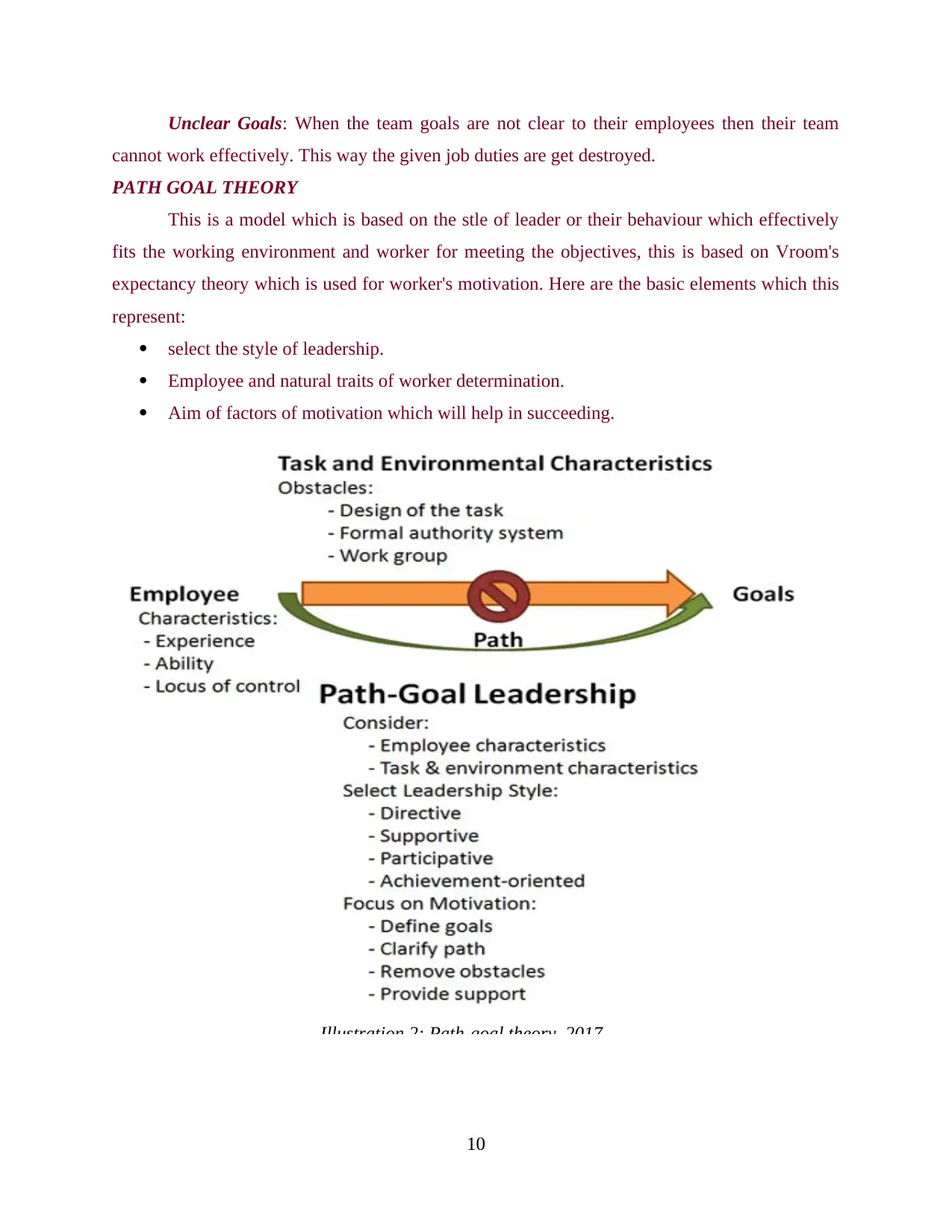
Unclear Goals: When the team goals are not clear to their employees then their team
cannot work effectively. This way the given job duties are get destroyed.
PATH GOAL THEORY
This is a model which is based on the stle of leader or their behaviour which effectively
fits the working environment and worker for meeting the objectives, this is based on Vroom's
expectancy theory which is used for worker's motivation. Here are the basic elements which this
represent:
select the style of leadership.
Employee and natural traits of worker determination.
Aim of factors of motivation which will help in succeeding.
Illustration 2: Path-goal theory, 2017
10
cannot work effectively. This way the given job duties are get destroyed.
PATH GOAL THEORY
This is a model which is based on the stle of leader or their behaviour which effectively
fits the working environment and worker for meeting the objectives, this is based on Vroom's
expectancy theory which is used for worker's motivation. Here are the basic elements which this
represent:
select the style of leadership.
Employee and natural traits of worker determination.
Aim of factors of motivation which will help in succeeding.
Illustration 2: Path-goal theory, 2017
10
⊘ This is a preview!⊘
Do you want full access?
Subscribe today to unlock all pages.

Trusted by 1+ million students worldwide
1 out of 15
Related Documents
Your All-in-One AI-Powered Toolkit for Academic Success.
+13062052269
info@desklib.com
Available 24*7 on WhatsApp / Email
![[object Object]](/_next/static/media/star-bottom.7253800d.svg)
Unlock your academic potential
Copyright © 2020–2026 A2Z Services. All Rights Reserved. Developed and managed by ZUCOL.





